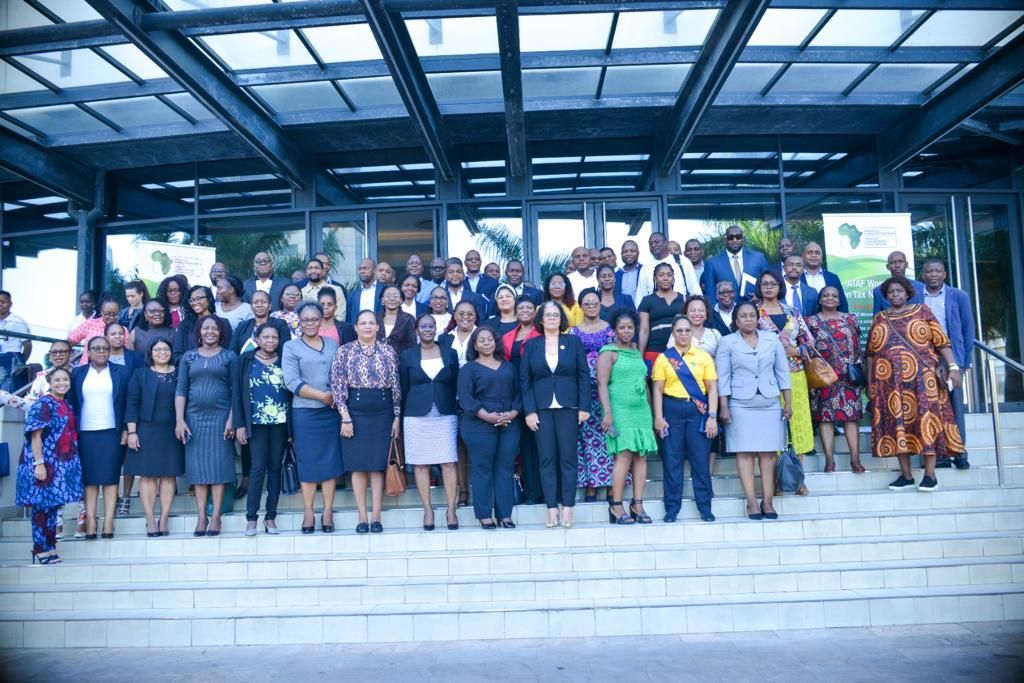OUTCOME STATEMENT: AWITN Leadership Dialogue
ATAF called upon all women working or studying in the field of tax across the African continent to join the ATAF Women in Tax Network through the ATAF Website.

Delegates during the ATAF Women In Tax Network Leadership Dialogue in Maputo, Mozambique on 15 February 2023.
Cet article est également disponible en français
Este artigo também está disponível em português
The ATAF Women in Tax Network’s Leadership Dialogue attracted over 687 participants from Revenue Administrations, Governmental organisations, Members of Parliament, Academic Institutions, Civil Society, African Development Bank (AfDB), Development Partners and private sector players. The Dialogue was a hybrid event with 119 participants attending in person in Maputo, Mozambique and over 260 participants joining virtually through Zoom Conferencing on the 15th of February 2023 under the theme THE ROLE OF TAX POLICY AND LEADERSHIP IN ADDRESSING GENDER INEQUALITY IN AFRICA. The event was hosted by the Autoridade Tributária de Moçambique and organised by the African Tax Administration Forum (ATAF).
The speakers in the various Sessions highlighted the following critical issues:
• By the close of 2022, the gender gap between the male and female population for Sub-Saharan Africa stood at 67.7 percent. It was further noted that women’s workforce participation stood at 26 percent while firms with Women Leaders stood at 17 percent. The leadership is mainly male-dominated making it difficult for gender-related issues to receive the attention they deserve. Women’s seats in parliaments stand at 21 percent. Commendable strengths were noted from the South African Revenue Service (SARS), Rwanda Revenue Authority (RRA), the Namibia Revenue Agency (NamRA) and the African Development Bank (AfDB) among others’ deliberate efforts in dealing with gender issues.
• According to the SIGI Regional Report of the OECD on Gender Equality on the African Continent, Women empowerment and gender equality have been a priority on the African continent for years. African countries have ratified the Convention on the Elimination of All Forms of Discrimination against Women, including discriminatory laws. Since 2000, women’s representation in politics has increased both globally and in Africa specifically. Temporary special measures such as quotas have played a pivotal role in promoting women’s rights and equality. Despite these efforts progress in achieving gender equality is uneven and slow across African countries. Further-more the COVID-19 pandemic has widened pre-existing gender gaps and heightened gender inequalities. At the pace the continent is going, it would take decades to close the current gender gap.
• Particularly in the African context, gender imbalances are fuelled by an outdated ideology of women being the “weaker sex”. Key policy actions to accelerate gender equality in Africa have to start with updating and eliminating legal provisions that are discriminatory and close legislation gaps as per the international and regional conventions. This will encourage nurturing interdependencies from amongst others, Governments, International stakeholders, and public and private sector partnerships to name but a few. The dialogue noted that when we devise and sustain more gender-focused policies and efforts, the gender inequality gap would shorten more quickly.
• While there is some progress made towards addressing gender biases through tax policy by abolishing explicit gender inequality laws, limited efforts have been made to address implicit biases. Participants noted the tax regime biases are more implicit than explicit, which come across as discriminatory though not deliberate. Tax policy seems more concerned about the taxation of the individual without disaggregating tax performance information to show the impact of taxation on women.
• Africa was challenged to aim for gender neutrality and destigmatize gender-related issues, including tax policies, by developing the right frameworks that encourage participation from all economic, social, and cultural performance and the labour market. The right frameworks in place will enable the mobilization of much-needed revenues to support adequate social programs for the benefit of those in need without sacrificing anyone’s dignity.
• Participants observed the need to hold more dialogue on the impact of tax policy and leadership decisions on gender. ATAF was called upon to come up with common solutions and a policy stance at the continental level to give individual tax authorities bargaining power with their governments. Serious commitments from the governments in Africa are required to close the gaps in tax policies. The first step countries can take is to collect adequate statistics for more informed decision-making on gender-sensitive issues and simplify the tax regimes for women in the informal sectors.
• Participants emphasized the urgent need for concerted efforts from different stakeholders and agreed that a holistic approach from Policy Makers would be very important to provide platforms to tackle issues related to capabilities, resources, and security, factors that affect women’s participation in economic development.
• It was further noted that a lot more research on gender and tax policy must be prioritised to come up with solutions on tax and gender inequality and the need to develop women on technical tax issues. The involvement of African governments, business and cultural aspects of gender issues across the continent was raised as an important part in crafting solutions.
• In conclusion, ATAF called upon all women working or studying in the field of tax across the African continent to join the ATAF Women in Tax Network through the ATAF Website.










